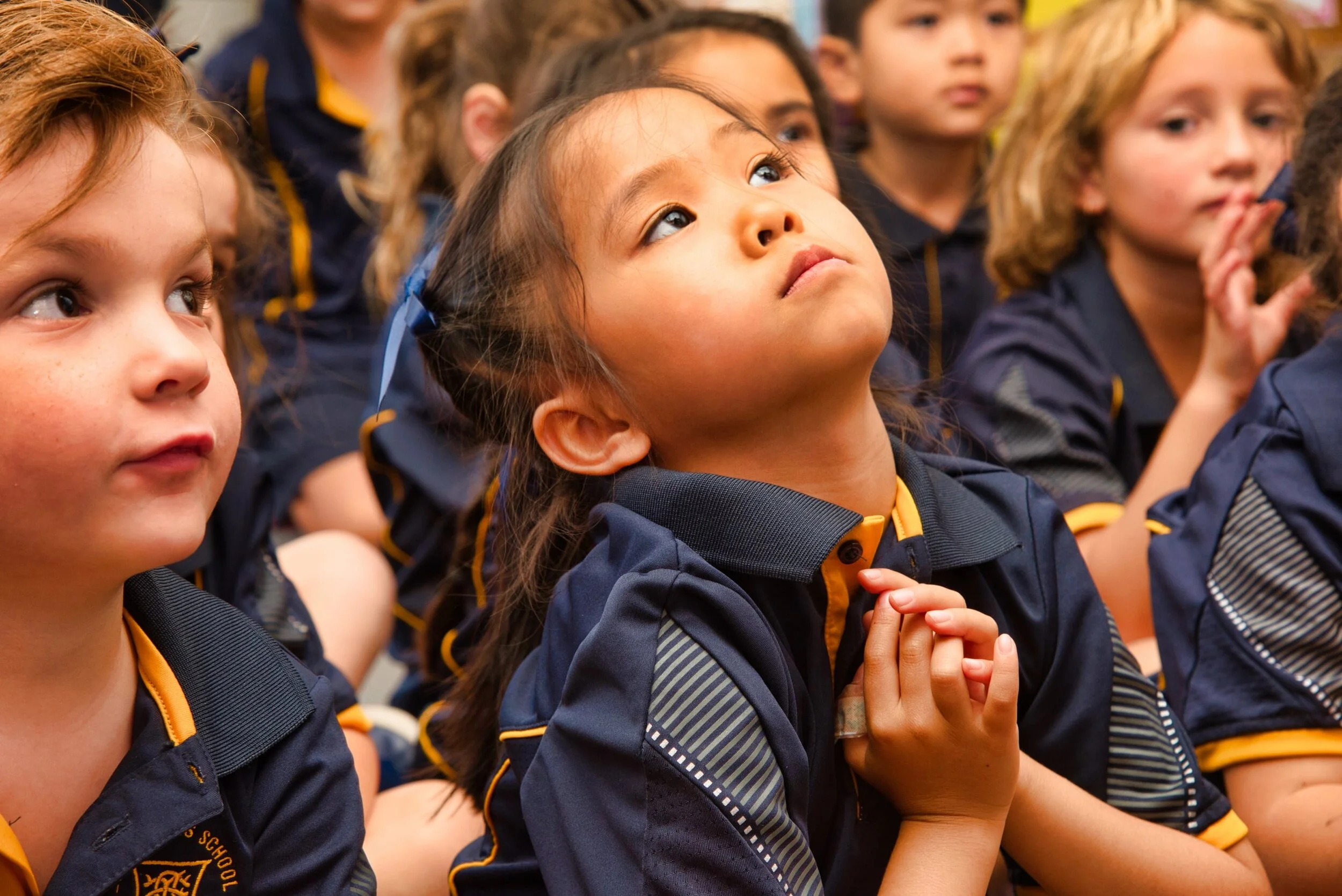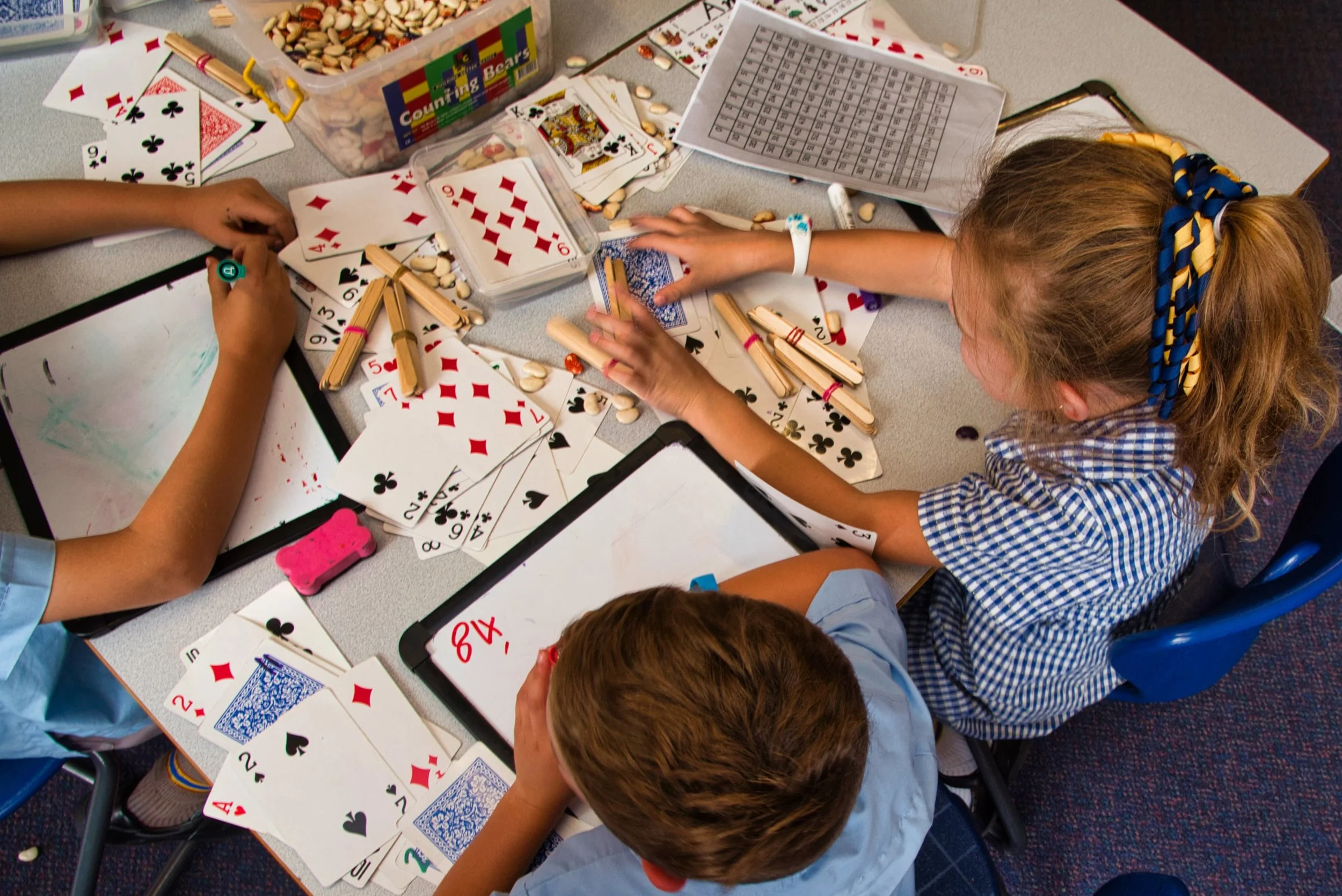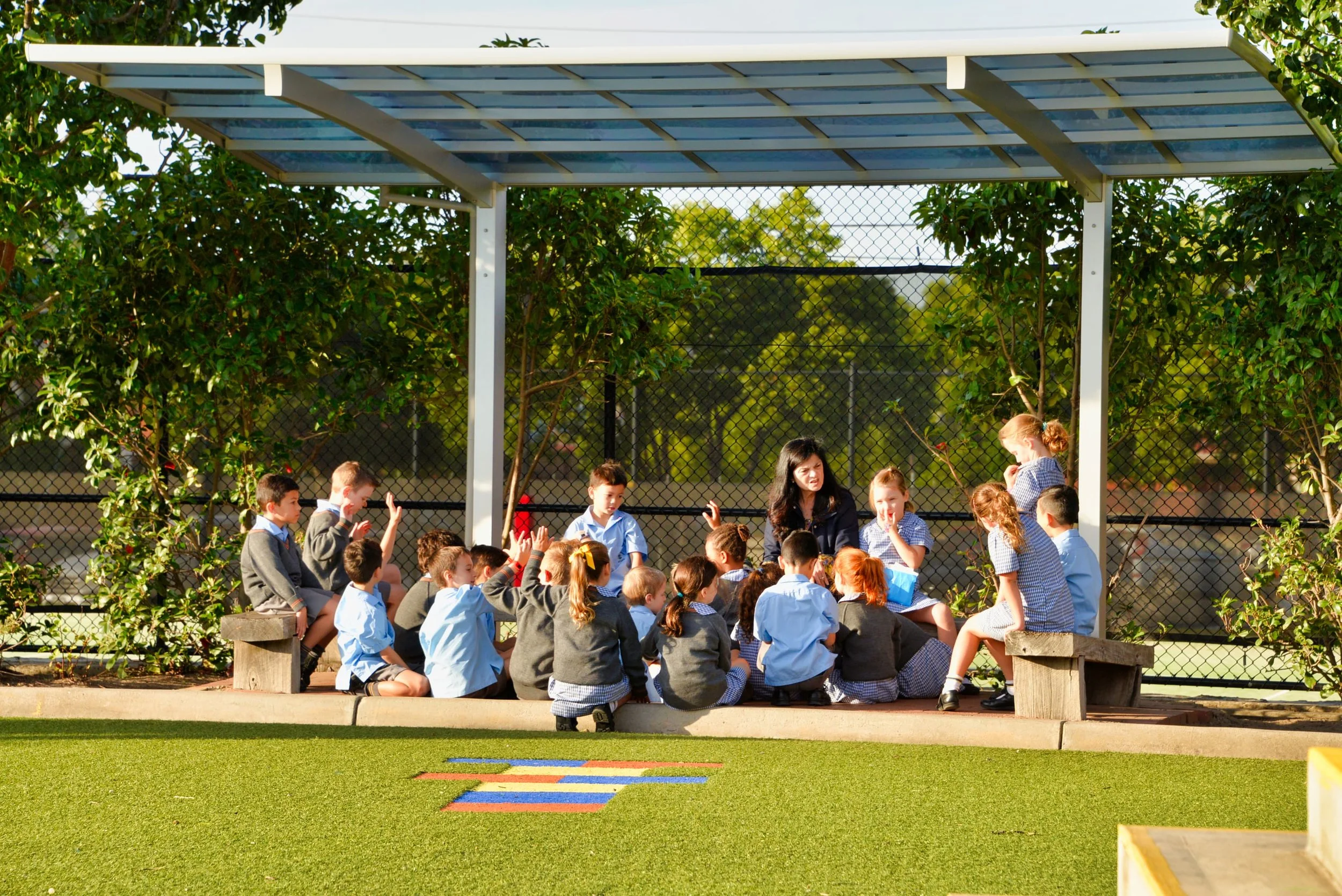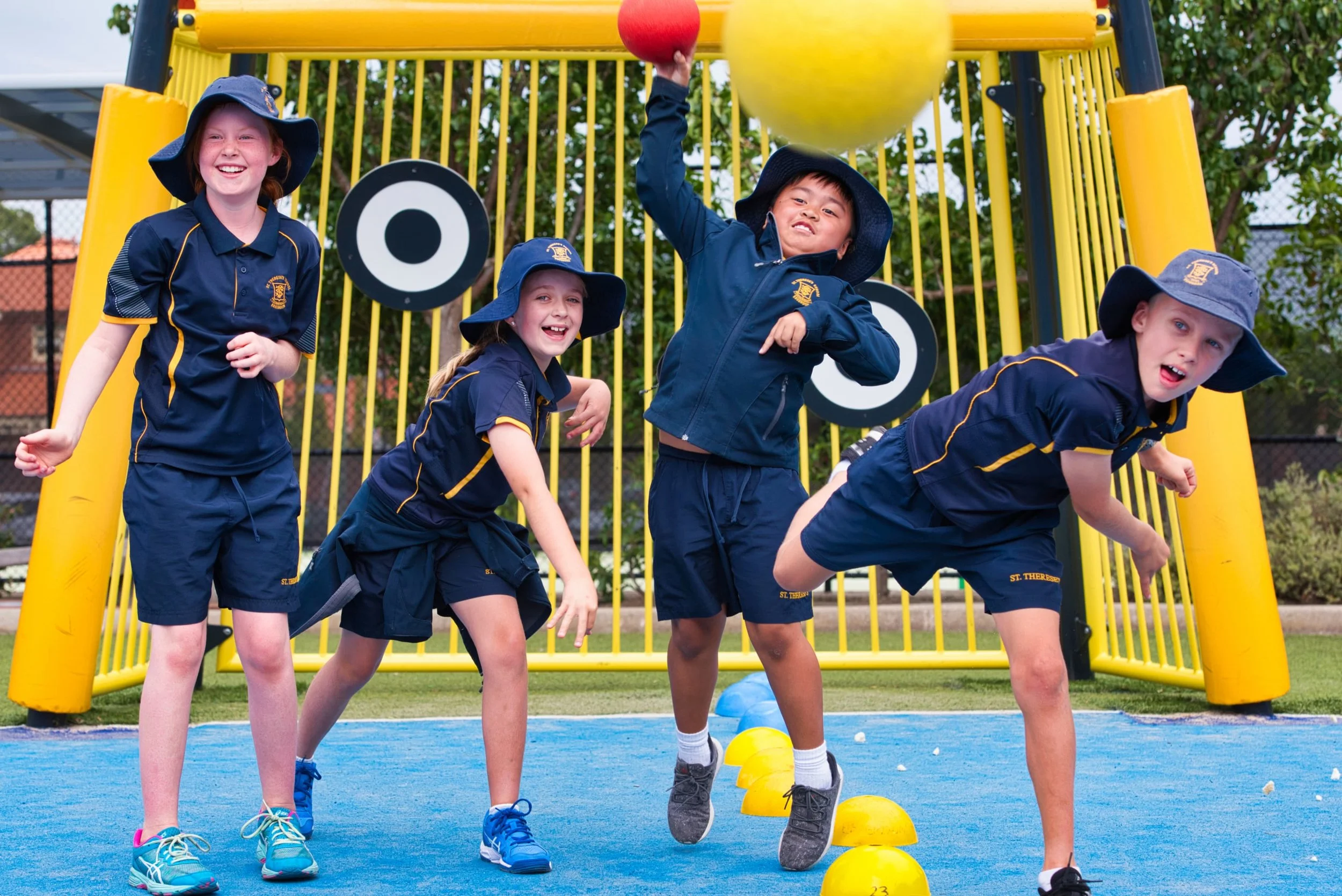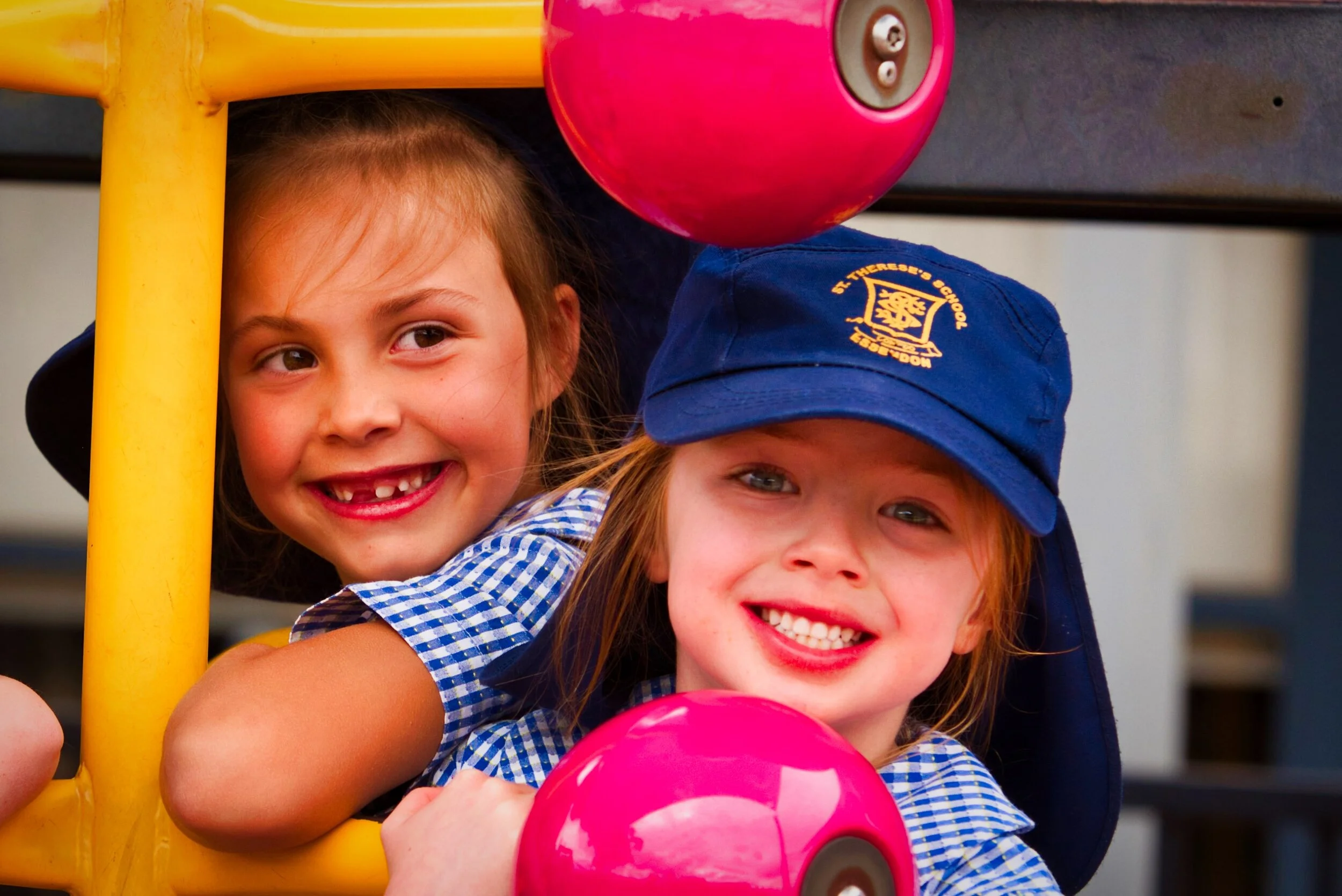Learner Profile
At St Therese’s, we recognise that learning, and learners, come in all shapes and sizes. We know that contemporary learners need to have both academic and holistic dispositions. Check out what a St Therese’s Learner looks like..
Religious Education
At St. Therese’s School, our Catholic identity permeates all that we do. The learning structure is based on 3 strands of learning:
Knowledge and Understanding (seeking truth)
This strand develops knowledge and understanding of the key practices and beliefs of Christian communities, both past and present, in ways that connect to and challenge the contemporary cultural context.
Reasoning and Responding (making meaning)
This strand focuses on the development of particular ways of thinking and acting that arise out of grappling with what it means to be a follower of Christ.
Personal Communal Engagement (living story)
This strand draws on a Catholic understanding of the sacramental life, where the sacred is encountered in the ordinary. Learners grow into a sense of self as loved and loving, reflecting on ‘who I am’ and ‘how I am’ in relationship with others.
The content of the learning in the framework is organised through five areas:
Jesus and Scripture
Church and Community
God, Religion and Life
Prayer, Liturgy and Sacrament
Morality and Justice
Sacraments
At St. Therese’s School, our Sacramental program runs throughout the school. Each year level will cover the understandings of Baptism, Penance (Reconciliation), Eucharist (Communion) and Confirmation in their own form.
The receiving of the school-aged Sacraments (Penance, Eucharist and Confirmation) occurs in the middle and senior years. Students in Year Three receive the Sacrament of Penance, Year Four students receive the Sacrament of First Eucharist and Year Six students receive the Sacrament of Confirmation. Our Sacramental program is closely linked with the Parish.
The students are given the opportunity to link in with the Parish in various ways, such as:
Family masses
Special events (e.g. Holy Thursday Washing of the Feet, Christmas Play at the Christmas Eve Mass)
Class led masses
Learning & Teaching
The curriculum at St. Therese’s is in line with the Victorian Curriculum. It outlines what is important for students to learn and develop during their time at school. We use these standards to plan programs for learning, assess student progress and report to parents. We make every attempt to integrate the curriculum to maximise this learning. The critical and creative thinking, ethical, intercultural, personal and social capabilities are embedded across all subject areas.
Assessment is an important and continual part of the teaching and learning cycle. Teachers continually monitor and track growth and progress. The information which is gained is then used to plan for student learning.
English
The study of English is central to the learning and development of all young Australians. It helps create confident communicators, imaginative thinkers and informed citizens. (Victorian Curriculum)
Literacy at St Therese’s is highly structured with targeted teaching using the Victorian Curriculum on a daily basis. We strive to ensure that there is a common pedagogical approach throughout the school. Students engage in a two hour literacy block learning and acquiring the skills for reading, writing, speaking and listening.
At St Therese’s students Speaking and Listening is the basis of all literacy. It is incorporated in everything we do. Skills are taught to support student in conveying and receiving meaning.It also involves the development of active-listening strategies.
English sessions that focus on reading are comprised of whole group, small group and individual teaching. Reading skills are taught explicitly in Literacy sessions using a variety of strategies and approaches. In the early year of school a major focus is placed on teaching explicit phonics teaching, to develop phonological awareness and reading fluency . As students become more experienced a greater focus in placed on extending comprehension skills.
Writing at St Therese’s involves the process of conceiving, planning, composing, editing and publishing a range of texts. It involves using appropriate language for particular purposes or occasions, both formal and informal, to express and represent ideas and experiences. It involves the development of knowledge about strategies for writing and the conventions. The teaching of grammar and spelling is taught explicitly to support them with writing.
Literacy teaching is integrated into all areas of the curriculum so that learning connects the students to the real world providing relevance and purpose.
Literacy Intervention
Short-term literacy intervention, is provided through a selection criteria. It is regular, intensive, small-group instruction, which supplements classroom literacy teaching. It is designed to support struggling readers with strategies to further support their progress in Reading. Particular attention is given to supporting student with their phonological awareness to build skill in learning to read.
Numeracy
Mathematics has developed into a sophisticated, complex body of knowledge that pervades all aspects of our lives. It has applications in all human activities and everyday situations. Competence in Mathematics enhances our understanding of the world and the quality of our participation in society.
The Mathematics Curriculum at St. Therese’s is an important and integral part of the total school program. It aims to enhance the mathematical experiences and guide students through the various developmental stages so they are equipped with competent and flexible numeracy skills.
At St Therese’s, we aim to:
Provide learning opportunities for students to develop conceptual understanding, rather than learn multiple ‘rules without reasons’
Equip students with mathematical skills and knowledge so they can deal confidently and competently with daily life
Develop a ‘love of mathematics’ in students
Develop an increasingly sophisticated understanding of mathematical concepts and fluency with processes and are able to pose, solve problems and reason in the areas of Number and Algebra, Measurement and Geometry and Statistics and Probability
Use a variety of modes of classroom activity (such as partner work, small group work, whole-class activities)
Recognise individual differences and different learning styles and needs
Include investigations, problem-solving and open-ended tasks throughout the learning experiences
Use data to inform our teaching
Numeracy Intervention (EMU)
The Extending Mathematical Understanding (EMU) Program is a short term, intensive numeracy intervention program that targets students in Year One and Year Two who are struggling in aspects of whole number learning. Students are identified based on analysis of the Mathematics Assessment Interview, which is administered by the classroom teacher at the beginning of the year. From these results, students are identified and selected to be on the EMU program.
The program involves the EMU specialist teacher working with groups of three students, outside the classroom five times per week for 30 minutes per lesson for a period of 10-20 weeks. The sessions consist of activities that allow the students to develop their counting skills; rich tasks focusing on pattern, addition and subtraction, multiplication and division and measurement contexts; and concludes with reflection time. Students will be given daily tasks to be completed at home with their families. For the program to make a significant impact on the participants, home support is crucial.
Adapted from Extending Mathematical Understanding Intervention, Ann Gervasoni, 2015.
Inquiry
St Therese’s follows an Integrated Inquiry approach from Year Prep to Six.
Our Inquiry approach embraces the philosophy of lifelong learning. It endeavours to support the development of strategies to develop thinking processes, research skills, collaboration, independence and positive learning dispositions.
An inquiry approach is used across many of the learning areas of the Victorian Curriculum, including: History, Geography, Science, Health, Design Technologies, Personal and Social Capability, Ethical Capability, Intercultural Capability and Critical and Creative Thinking.
Where possible we strive to make the learning relevant and meaningful for students and helps them make connections to their own world. Students are supported to process information and respond to their new knowledge. The goal is to develop and empower the potential of all students to participate and contribute in their community and the contemporary world.
Specialist Program - Physical Education
The Health and Physical Education program at St. Therese’s School provides students with knowledge, skills and behaviours to enable them to achieve a degree of autonomy in developing and maintaining their physical, mental, social and emotional health.
Our program focuses on the importance of a healthy lifestyle and physical activity in the lives of individuals and groups in our community. We promote the potential for lifelong participation in physical activity through the development of motor skills and movement competence, health-related physical fitness and sport education.
Students’ involvement in physical activity takes many forms, ranging from individual, non-competitive activity through to competitive team games. Emphasis is placed on combining motor skills and tactical knowledge to improve individual and team performance in students at St. Therese’s. Students progress from the development of basic motor skills to the performance of complex movement patterns that form part of team games. They learn about developing physical capacity in areas such as strength, flexibility and endurance in relation to both fitness and physical performance.
All students participate in two Physical Education sessions a week, one with a specialist teacher and the other with their classroom teacher.
St. Therese’s Annual Sport Carnival is held during Term 1 at the Moonee Valley Athletics Centre. The students compete in a combination of track and field events, and tabloid sports in their team colours: Red, Blue, Green and Yellow. We also participate in regional inter-school cross-country and swimming carnivals held at various times throughout the year.
Year Six students participate in summer and winter inter-school sport with seven other schools in the Buckley Region, through which they can potentially move to regional and state competitions.
Specialist Program - LOTE
Italian is the LOTE program offered at St. Therese’s School. The students from Prep to Year Six participate in a weekly Italian lesson. The program consists of both language acquisition and cultural learning.
The students in Prep learn the names of some colours, self, family members, fruits, animals and numbers. They then build upon this knowledge in subsequent years as well as learning about topics such as body parts, items of clothing, days of the week, classroom items, time, food, transport, feelings and adjectives to name but a few.
Students learn to follow simple classroom instructions and to use various greetings and other set phrases in Italian. Important times of the year such as Easter and Christmas are looked at from an Italian perspective and students have the opportunity to complete related activities. All the students participate in several ‘Google’ trips to Italy to become virtual tourists and broaden their knowledge in particular areas.
Gestures have been progressively introduced over the past few years to facilitate the use of functional language in the classroom.
All students participate in the annual Multicultural Day celebrations which has a different focus each year. On this day, students learn more about other cultures by completing various activities, often in multi-age groupings, related to art, drama, cooking, geography, sport, games, stories, etc.
Specialist Program - Music
St. Therese’s School offers an enriching music program from Prep to Year Six. Orff and Kodaly methodologies are taught throughout each year level where each student is able to create, compose and perform, promoting an all-inclusive approach to music making.
In Prep, Year One and Year Two, emphasis is on developing a repertoire of songs specifically chosen to encourage tuneful and accurate pitch and singing techniques. The playing of percussive instruments along with singing and creative movement encourages spatial and body awareness as students move and play to the beat of the music.
Students in Year Three and Year Four explore the elements of music as they improvise, arrange, compose and accurately perform music using body percussion and a variety of tuned and untuned instruments. They formulate responses to music, exploring various purposes and intentions for music in their own and other cultures. During these years, students are introduced to woodwind and string instruments through our recorder and ukulele programs.
Year Five and Six students can aurally recognise and describe musical features of works, discussing and comparing the musical elements of a variety of works from their own and other cultures and times. They use instruments and technology to create and perform their own original compositions, and compare and analyse the works of others. Year Six students learn ensemble and musicianship skills in addition to more complex rhythmic patterns in our African drumming program.
Through singing, creative movement and the development of skills on a range of instruments, students are offered exciting opportunities to embark on their own creative journey and expand their musical horizons.
St Therese’s also facilitates a private music lesson program for students who interested in further developing their instrumental skills in a small group lesson environment.
Specialist Program - STEM
St. Therese’s offers a very comprehensive STEM program across all year levels and is well equipped in terms of providing up-to-date equipment and software.
The aim of the program is to equip our students with the knowledge and skill set they need to develop and prosper in a society where technology is advancing rapidly everyday. This is done through a variety of tasks and challenges, both aimed at the emerging learners in the lower year levels to the more developed, techno-savvy students in the upper year levels. Our STEM program involves solving real-world problems, Our students develop skills in problem-solving, critical thinking, teamwork, and communication.
St. Therese’s also facilitates a 1to1 portable device program in Years Four to Six which enables the students to fully immerse themselves in the possibilities that online learning holds. All subsequent year levels are equipped with shared class sets of iPads and Chromebooks alike.
Our students’ immersion into STEM begins right from Foundation where they start to develop the fine motor skills of moving and controlling a mouse, a skill that as adults we sometimes take for granted. They continue to develop throughout the Junior years, adding to their knowledge and skills base, so they are ready to perform more complex tasks in the Middle and Senior years.
By the time the students reach the Middle years, they are ready to extend their learning further and adapt the things they have learnt to a variety of programs and applications. They use Digital Technologies to present, explain, entertain and discover as they are presented with a number of opportunities to try the latest education based technology on offer. From here, they are also introduced to G Suite for Education, and begin to work with the amazing tools and apps provided by Google.
In the Senior years, the students are offered a chance to work with various programs they may use throughout Secondary School and beyond. Units involving coding, robotics and CAD (Computer Aided Design) are explored that help shape our future thinkers.
Specialist Program - Creative Arts
St Therese’s Creative Arts program aims to provide an engaging and stimulating environment, which will nurture the student’s love of The Arts: both Drama and Visual Art, as well as their curiosity in learning about and contributing to the world around them.
The Drama program involves various experiences in kinesthetic awareness, communication skills and collaboration. Drama skills developed during these sessions across the year levels include: utilising movement and body language, using facial expression to show emotions, tableaux/freeze frame, using tension to build excitement in a dramatic performance, using voice to portray a character and express emotions, using space effectively and safely (spatial awareness), using dialogue to connect characters and tell a story and about characterisation (choices about how a character is played). We also view and respond to live or filmed performances using drama terminology.
The Visual Art program includes creating and making visual art projects whilst learning skills, techniques and processes with various mediums. Students explore Line, Colour, Shape, Form, Texture and Pattern. Visual Art concepts developed during these lessons across the year levels involves: exploring visual arts practices as inspiration to create artworks that express different ideas and beliefs, exploring visual approaches to art and use materials, techniques, technologies and processes to make artworks, and exploring different ways of displaying artworks to enhance their meaning for an audience.
Students in Year 5 and 6 also have the opportunity to be an arts leader for the younger classes. This role is fantastic for building leadership, confidence and Arts skills for the seniors, it also provides strong role models in Creative Arts and benefits the social and emotional learning of our junior students.
Art gives us meaning and helps us understand our world. Scientific studies have proven that art appreciation improves our quality of life and makes us feel good. When we create art, we elevate our mood, we improve our ability to problem solve, and open our minds to new ideas. Creative Arts encourages self-expression and creativity and can build confidence as well as a sense of individual identity.


